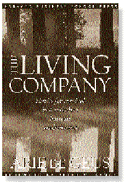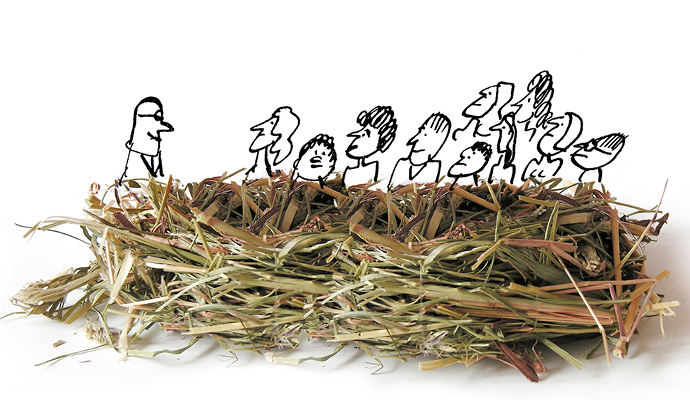"The Living Company" by Arie de Geus
The Living Company: Habits for Survival in a Turbulent Business Environment by Arie de Geus (215 Pages, Harvard Business School Press, 1997)
(originally published by Booz & Company) For Arie de Geus, the corporation is an important institution. The ultimate corporate man, Mr. de Geus spent 38 years with the Royal Dutch/Shell Group, eventually becoming group planning coordinator. Such loyalty runs in the family — Mr. de Geus's father also worked for the company for 26 years. In the era of career management and employability, this sort of devotion is decidedly unfashionable.
For Arie de Geus, the corporation is an important institution. The ultimate corporate man, Mr. de Geus spent 38 years with the Royal Dutch/Shell Group, eventually becoming group planning coordinator. Such loyalty runs in the family — Mr. de Geus's father also worked for the company for 26 years. In the era of career management and employability, this sort of devotion is decidedly unfashionable.
Initially, as you read The Living Company, you feel a slight disappointment at the thought of Mr. de Geus, a highly intelligent, talented man, spending his entire career with one company. You feel that he has been shackled and wonder what might have happened if he had been set loose.
Lurking behind such responses is the now commonplace assumption that being a corporate man or woman is a bad thing; that unswerving loyalty diminishes instead of enriches. It is here that we are wrong. For Mr. de Geus — and many thousands of others — loyalty is not cheaply bought. He remained curious and questioning to the end of his corporate career. The thing he questioned most was the monolith above him: the corporation.
The more Mr. de Geus examined the body corporate, the more he became concerned about its life expectancy. Companies may be legal entities, but they are disturbingly mortal. "The natural average lifespan of a corporation should be as long as two or three centuries," he writes, noting a few prospering relics such as the Sumitomo Group and the Scandinavian company, Stora. The reality, however, is that companies do not head off into the Florida sunset to play bingo. They usually die young.
Mr. de Geus quotes a Dutch survey of corporate life expectancy in Japan and Europe that came up with 12.5 years as the average life expectancy of all companies. "The average life expectancy of a multinational corporation — Fortune 500 or its equivalent — is between 40 and 50 years," he writes, noting that a third of 1970's Fortune 500 had disappeared by 1983. (The combination of the Royal Dutch Petroleum Company and the Shell Transport and Trading Company dates to 1907, though the roots of the individual companies go back to the 1800's.)
Such endemic failure is attributed by Mr. de Geus to the focus of managers on profits and the bottom line rather than the human community that makes up their organization. In an attempt to get to the bottom of this mystery, Mr. de Geus and a number of his Shell colleagues carried out some research to identify the characteristics of corporate longevity.
As you would expect, the onus is on keeping excitement to a minimum: more Ronald Reagan than James Dean. The average human centurion advocates a life of abstinence, caution and moderation, and so it is with companies. The Royal Dutch/Shell team identified four key characteristics. The long-lived were sensitive to their environment; cohesive, with a strong sense of identity; tolerant, and conservative in financing. (These conclusions are echoed by Jerry Porras and James Collins in their equally thought-provoking book, Built to Last, which almost serves as a companion volume.)
Key to Mr. de Geus's entire argument is that there is more to companies — and to longevity — than merely making money. "The dichotomy between profits and longevity is false," he argues. His logic is impeccably straightforward. Capital is no longer king; the skills, capabilities and knowledge of people are. The corollary from this is that "a successful company is one that can learn effectively." Learning is tomorrow's capital. In Mr. de Geus's eyes, learning means being prepared to accept continuous change.
Here, Mr. de Geus provides the new deal: contemporary corporate man or woman must understand that the corporation will, and must, change and it can only change if its community of people change also. Individuals must change and the way they change is through learning. As a result, Mr. de Geus believes that senior executives must dedicate a great deal of time to nurturing their people. He recalls spending around a quarter of his time on the development and placement of people.
According to de Geus, all corporate activities are grounded in two hypotheses: "The company is a living being; and the decisions for action made by this living being result from a learning process." With its faith in learning, The Living Company represents a careful and powerful riposte to the corporate nihilism of the early 1990's. In a throwaway line of revealing honesty, de Geus recalls a meeting to discuss job cuts at Shell. "But what about the loss of human potential, experience and loyalty?" said a single voice. De Geus was silent, but his regret can be felt throughout the book.
The Living Company proposes that the wisdom of the past be appreciated and utilized rather than cast out in some cultural revolution. Contrast this with reengineering that (as practiced, if not necessarily preached) sought to dismiss the past so that the future could begin with a new piece of paper. De Geus suggests that the paper already exists and notes are constantly being scrawled in the margins as new insights are added.
Mr. De Geus's arguments are probably at their weakest when he contemplates why it is that companies deserve to live long lives. After all, the average entrepreneur would probably accept a life expectancy of 12.5 years. "Like all organisms, the living company exists primarily for its own survival and improvement: to fulfill its potential and to become as great as it can be," he writes. But life is littered with failed stars. Some fall by the wayside. We cannot all be great. We cannot all be Shell.
De Geus admits to surprise when asked, "'Why is it so important that Shell should survive?" Mr. de Geus's response is telling: "To me it was so natural that companies should seek their own survival. I had seen nothing else in my life. Companies struggle to keep going and to grow, for as long as possible." He rightly describes the human implications of a company's death and says that "people do, in fact, mourn when a company dies." The question must be what it is that they are mourning? Is it the salary, the security of work, the camaraderie, the power or the work itself? I remain doubtful whether people really do mourn companies.
Nevertheless, a sense of the greater good permeates The Living Company. It is refreshingly honest. It is the testimony of someone who practiced the human side of enterprise and who believes that companies must be fundamentally humane to prosper, whatever the century. ![]()
| Authors
Stuart Crainer (stuart.crainer@suntopmedia.com) is a U.K.-based business journalist and a contributing editor to strategy+business. Mr. Crainer is author and editor of numerous management books, including the Financial Times Handbook of Management (Financial Times Prentice Hall, 2001) and The Management Century: A Critical Review of 20th Century Thought and Practice (Jossey-Bass, 2000). |


